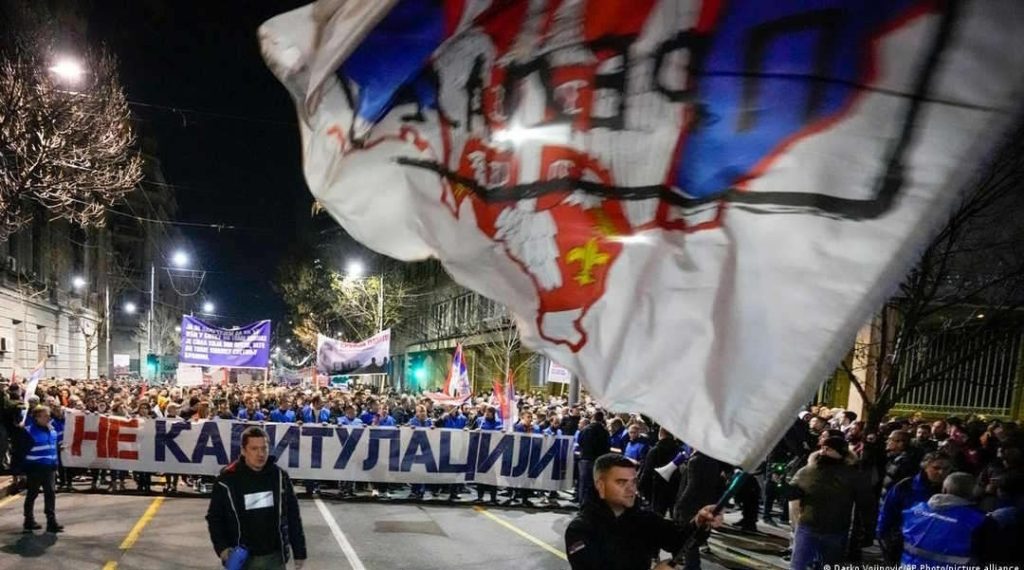While Kosovo and Serbia verbally agreed to implement a deal to normalize relations approved by the EU over the weekend, there are still differences and uncertainty about how some clauses would be implemented.
EU-sponsored negotiations between Belgrade and Pristina have been ongoing since 2011, three years after Kosovo proclaimed its independence in 2008 following the Kosovo-Serbia war of 1998–1999.
Nonetheless, Serbia continues to view Kosovo as a secessionist province, and tensions have risen between the Balkan neighbors throughout the years, peaking in 2022, fueling fears of a resumption of hostilities.
Albin Kurti, the prime minister of Kosovo, and Aleksandar Vucic, the president of Serbia, met for 12 hours on Saturday, March 19, to discuss the implementation of the arrangement that both parties verbally agreed to in Brussels last month.
According to the 11-point plan from last month, Serbia and Kosovo must establish cordial ties and respect each other’s independence and territorial integrity.
Ohrid agreement
No agreement was reached at the Ohrid, North Macedonia conference, and the EU said it intended to do more.
The EU’s top diplomat Josep Borrell said the agreement fell short of a “more ambitious and detailed” EU proposal that the parties were unable to agree on, despite Pristina’s commitment to greater autonomy for areas with a Serb majority and Belgrade’s agreement not to obstruct Kosovo’s membership in international organizations.
According to Borrell, the sides could not reach a compromise as bold as we suggested.
Borrell criticized Kosovo for its lack of substantive flexibility and Serbia for its refusal to ratify the agreement despite claims that it was “completely prepared to implement” it.
He added that the EU would now firmly insist that both sides uphold their responsibilities if they want to join the bloc, warning that there will be consequences otherwise.
Borrell later tweeted that both the appendix and the agreement are deemed accepted, adding, “The parties have ultimately agreed to honor all provisions of the contract and perform their respective commitments promptly and in good faith.
He continued that the implementation annex would become an essential and binding component of the two nations’ European paths.
Details of the agreement
The parties agreed to establish a Joint Monitoring Committee within 30 days, which the EU will preside over, according to the annex on the agreement’s implementation that the EU’s diplomatic office issued on Saturday night.
In contrast to previous accords, this approach would include more frequent reporting to member states on the implementation status; senior EU officials had informed reporters earlier last month.
Establishing the Association of Serb Municipalities in Kosovo was one of the most controversial issues in the negotiations.
Current positions of the parties
“An implementation addendum to the Basic Agreement has now been agreed upon. Similar to the previous conference in Brussels, Serbia has avoided signing both the agreement and the annex, according to Kurti.
While Vucic stated on Sunday that Serbia wishes to have normal relations with Kosovo, it would not sign any agreements with it (19 March).
He stated, “I don’t want to sign any international legally binding documents with Kosovo because Serbia does not recognize its independence. I didn’t want to sign the agreement on the implementing annex last night, not the EU-backed deal.”
“I have tremendous fears in my right hand, I can only sign with my right hand and that discomfort is projected to remain for the next four years,” Serbia’s Vucic stated on TV.
Russian provocation
“Anti-war” activists are being caught in the crossfire as Serbia’s ultra-nationalists use Russia’s invasion of Ukraine to bolster their campaign against Kosovo’s independence.
Even as Serbian President Aleksandar Vui participates in negotiations to partially normalize relations with Kosovo, whose independence neither Belgrade nor Moscow acknowledge, politicians on Vui’s right flank have spotted an opportunity to link Russia’s conflict on Ukraine to their goal to engulf Kosovo.
Serbia has welcomed more than 200,000 Russians since the aggression started. It offers safe haven for people looking for an exodus for reasons ranging from economic to ideological, as it is one of only a few European nations that grants Russian passport holders visa-free admission.
According to Mia Vaci, the head of the fiercely nationalistic, pro-Kremlin Serbian Right political party, a win for Russian President Vladimir Putin in the Russo-Ukrainian war would pave the way for Serbia to retake Kosovo.
The protests occur before a meeting between Kosovo Prime Minister Albin Kurti and Serbian President Aleksandar Vucic that will take place on Saturday in North Macedonia.
The demonstrators came to express their disapproval of Vucic’s strategy and demand that he “reject everything” in the next meeting.
Banners saying “No to capitulation” and “Kosovo is not for sale” were also carried by the marchers.
Milos Jovanovic, one of the protest organizers and leader of the Democratic Party of Serbia, declared that “it [the pact] is a recognition [of Kosovo], whether you say it explicitly or whether it is indicated indirectly, it is still recognizable, and it is not acceptable].
Hundreds of nationalists demonstrated against a pact for normalizing relations between Serbia and Kosovo in Belgrade March 17 because they believed it recognized Kosovo’s sovereignty and was thus “unacceptable”
Image: Darko Vojinovic/AP Photo/picture alliance

